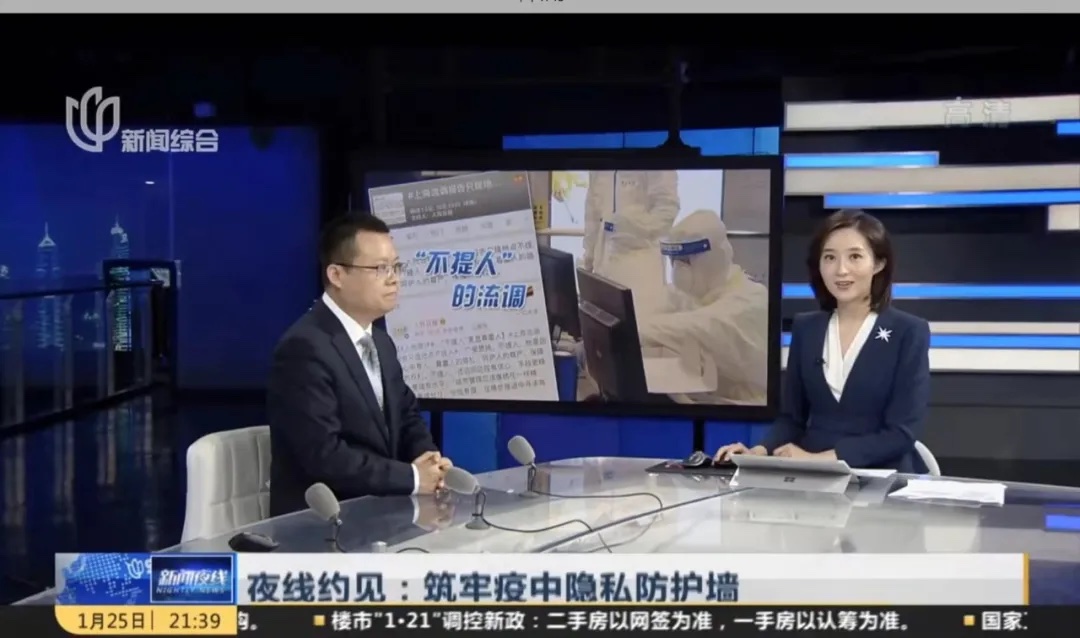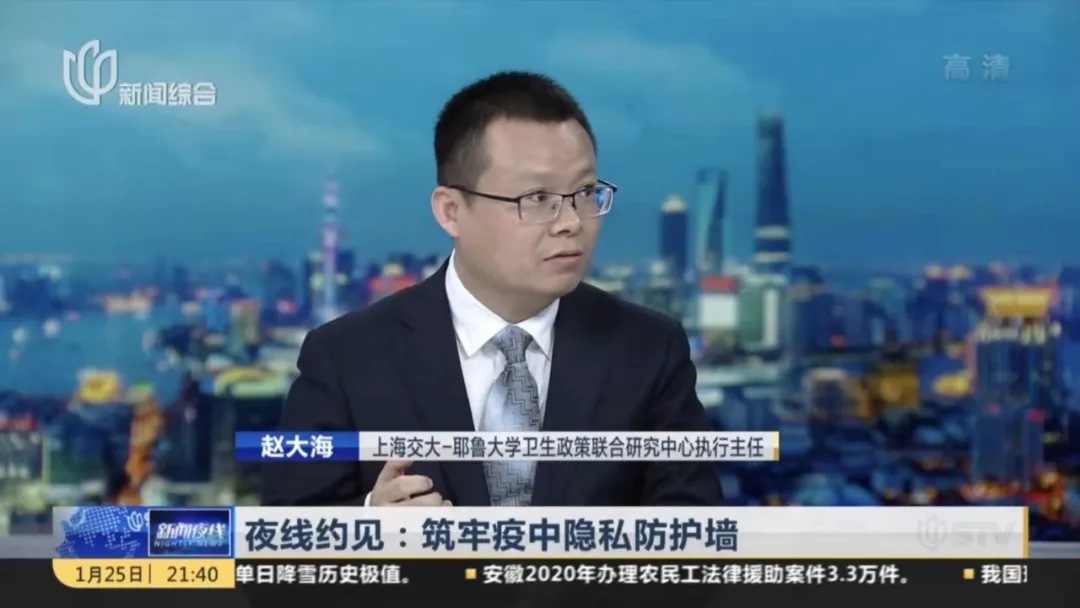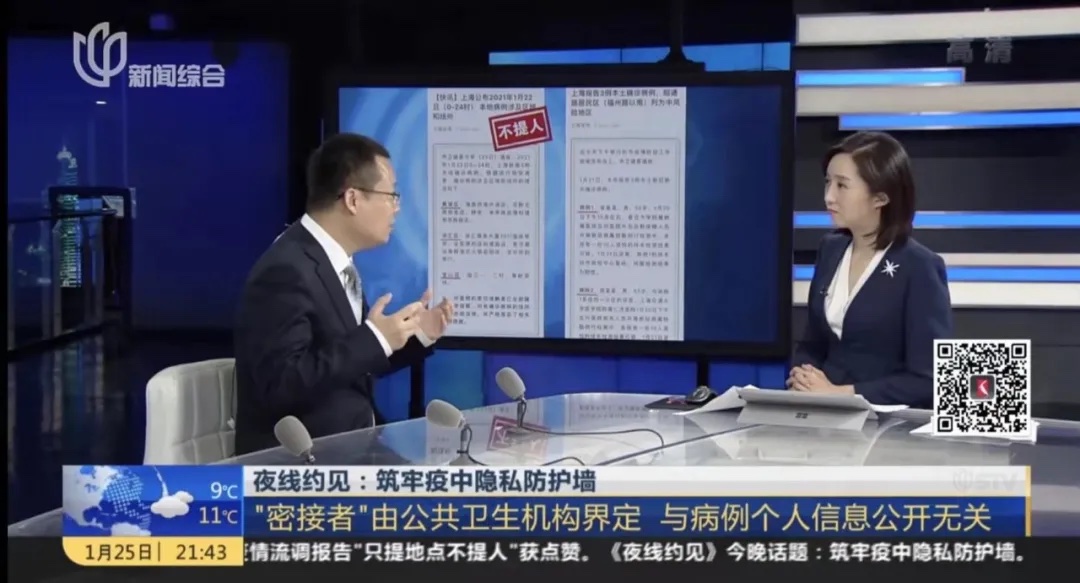上海交大赵大海做客上海电视台演播室:加强个人信息隐私保护是新冠疫情防控的内在要求

上海交通大学国际与公共事务学院教授、博士生导师,上海交通大学-耶鲁大学卫生政策联合研究中心执行主任赵大海,自新冠肺炎疫情暴发以来,对于新冠疫情暴发、防控以及卫生政策第30次接受上海电视台专访,也是第80次接受央视、上视专访。2021年1月25日,赵大海做客上海电视台新闻综合频道演播室,在《新闻夜线》节目就个人信息隐私保护和新冠疫情防控的相关话题进行了直播访谈。现将访谈内容摘录如下。
主持人周瑜:今天我们演播室邀请到的是上海交通大学-耶鲁大学卫生政策联合研究中心执行主任赵大海。在流调公布的过程当中出现了一些变化,我给大家来看看,就出现了一个“只提地点不提人”的变化。那之前我们还说到,比如说病例一是李某某,男,56岁,但是现在再说的时候就只发布了一个黄浦区相关地点的信息,这个变化怎么看?您觉得是不是有这个必要?
赵大海:我个人觉得应该讲是一个好的转变。其实对于疫情防控,特别是对流行病学调查,包括相关信息的披露而言,披露个人相关信息,比如说年龄、工作场所等,对于整个疫情防控没有太多指导性的意义。相反倒是比较容易在社会上引起不必要的恐慌。与此同时,也给相关当事人带来不少的个人困扰,特别是相关个人隐私的泄露等。这是我们在疫情防控的实践当中,不断的探索和摸索出来的疫情防控与个人隐私保护的转变。

主持人周瑜:对于疫情的防控来说,其实信息公布多少没有太大的影响,那对于生病的人或者说被流调这个人来说是有隐私的保护,但是还有一群人就是公众,公众在看到这样变化的时候,可能有的人会心里有一点担心,之前觉得说了某某这个名字,说了年纪之后,觉得那是一个特定的人;现在不说了之后,大家就会觉得,这个什么好像都没有告诉我,我心里就有点儿慌,大众的这种情绪的话,有没有考虑到?
赵大海:刚才您提到的就是说对大众的角度而言,可能确实更希望能知道一个具体的、能看得见摸得着的一个具体的人;但其实在整个的疫情防控当中,即便老百姓知道他是具体的谁,和完全不知道这个流调的人,或者说是这个疑似的患者是谁,对于整个疫情防控,特别是对于公共卫生机构专业人员进行流调和疫情防控,其实完全没有任何区别。因此,我们需要一个过程,需要公共卫生相关机构的工作人员,包括相关的政府,向公众不断的来解释,就说我们在疫情防控和尊重保护个人相关隐私之间,一定要掌握一个平衡点,首要的应该是尊重个人的隐私;只有尊重了个人隐私,才能真正实现群防群控的疫情防控。

主持人周瑜:这次疫情当中我们也发现了,持续了一年时间之后,我们知道这个疫情不光光是政府或者说是相关医疗机构的事情,每一个人在其中都有自己的作用,比如说在流调这件事情上,我有的时候不去人肉,不去把这个事情非要追究到某一个个体的身上的时候,这可能就是我们每一个人该去有的一个心态和意识,那么就专业的机构来看的话,大家的惶恐我想也是可以理解的,在保护隐私和公布更多的信息之间,这两者之间您说要有一个平衡,这个平衡的尺度在哪里,尤其是流调这件事情并不是因为这次疫情才有的,之前的流调也这么多年都在进行,是不是在之前我们有比较明确的规定,这两者之间的平衡是有一个点的?
赵大海:对于流调,或者说对于在流调过程当中相关人员信息的披露,我们确实没有一个非常明确规定的标准。因此,我们在具体的操作过程当中,就出现了之前我们会将相关人比较详细的信息披露给公众,现在我们只披露这个相关的地点,比如说居住的大体场所等。对于具体的标准,我们确实没有,但是我们会有一个约定俗成的原则:如果是为了疫情防控,特别是为了追溯密切接触者,必须要公开的信息,主要是为了配合来找到密切接触者,因为大数据的方式也是近几年才使用的方式,我们是必须要公开的。但是如果是与整个疫情防控,特别是追溯密切接触者,没有直接关联的个人的信息,我们是不应该去公开的。
主持人周瑜:就比如说,看单个来讲,比如说李某某,56岁,这个似乎是没有指向某一个个人的,但可能对于熟悉的人,那个片区的人来说,有了三个字的名字,有了年龄可能就能对上是谁了。
赵大海:是,确实会存在这个问题。特别是现在网络普及,比较容易能够人肉到某一个具体的人,但其实对于我们疫情防控而言,没有任何正向的意义。因此,我相信现在有关部门也主要是考虑到这一点,才逐步地缩小了公开的信息。
主持人周瑜:刚刚游律师提到应该把这些处罚明确,并且是公开,按照现在的这个法律的条文来说,是不是已经规定了算是够明确了?
赵大海:我觉得,相关的法律,包括相关的法规,已经对个人隐私的保护,特别是与医疗机构或者说疫情防控相关的个人隐私的保护,已经有了比较明确的界定。
主持人周瑜:那现在的问题出在哪?我们还是看到一起一起的泄漏的这个事故在发生。
赵大海:我比较认同刚才游律师所提到的。另外,我再稍微补充一下,就是说,现在从事流调,包括对于疫情防控当中个人信息接触到、碰触到的一些相关人员,目前虽然我们有了比较明确的法律规定,但相关人员对于这些法律法规,很多人还不清楚,甚至是完全不知道有相关的法律法规。
主持人周瑜:是不是因为我们的处罚没有跟上,处罚的公开也没有跟上?
赵大海:应该讲是的,就是说,我们并没有做到违法必究、执法必严。与此同时,我们必须要对于相关工作人员,包括流调,包括疫情防控当中能够接触到个人信息的所有工作人员,需要对他们进行相关法规的培训工作。当然,刚才您提到的必须要做到违法必究、执法必严,只要有违法,我们将相关人员进行追责,追究法律的责任,甚至是刑事的责任,而且将相关的这个案例实时进行公开,那我相信我们个人隐私的保护就会提升到一个比较高的层次。
主持人周瑜:那就您的观察来看,刚才我们说的这一部分是上海在流调方面可能需要再提升的最重要的部分吗?除此之外,还有没有其他?
赵大海:除此之外,我们其实一直在不断的探索,在保障公众的知情权和尊重相关人员个人隐私保护之间的一个平衡点,但是现在我们不敢说,我们已经找到了这个平衡点。我们需要在接下来的工作当中,不断地去积累经验,包括在真正落实和贯彻相关法律法规当中,进一步地来找到更好的平衡点。
供稿者:上海交通大学
日期:2021年1月26日
Dahai ZHAO’s Exclusive Interview with ShanghaiTV Studio: It is an inherent requirement of containing COVID-19 to provide individuals with personal privacy protections
Dahai Zhao, a doctoral supervisor at the School of International and Public Affairs of Shanghai Jiao Tong University and Executive Director of Shanghai Jiao Tong University-Yale University Joint Research Center for Health Policy, has been interviewed by ShanghaiTV for the 30th time (the 80th time by CGTN / ShanghaiTV) since the COVID-19 pandemic. On January 25, 2021, Zhao commented on personal privacy protection in COVID-19 containing on “News Night-line” of the news channel of Shanghai TV.
ZHOU Yu (The anchor): Today we are joined in the studio by ZHAO Dahai, executive director of SJTU-Yale Joint Center for Health Policy. In the process of the publication of epidemiological surveys, there have been some changes of "Just the places, not the people". Before that, when talked about, for example, we said case one was Mr. Li, male, 56 years old. But now, we only released the information of the relevant location of Huangpu District. How do you see this change? Do you think it's necessary?
ZHAO: Personally, I think it's a good change. In fact, for epidemic prevention and control, especially for epidemiological investigation, including the disclosure of relevant information and the disclosure of personal information, such as age, workplace, etc., does not have much guiding significance for the overall COVID-19 prevention and control. On the contrary, it is easier to cause unnecessary panic in society. At the same time, it also brings a lot of troubles to the people concerned, especially the disclosure of personal privacy. This is the transformation that we have explored in the practice of COVID-19 prevention and control to provide individuals with personal privacy protections.
Zhou Yu: For epidemic prevention and control, it doesn't really matter how much or how little information was published. It was the privacy protection for the confirmed cases or the individuals who were under epidemiological investigation. But for the general public, when things changed, some people may be a little worried. It felt like it was relevant with a specific person when was mentioned with his/her family name with age in the past. But it wasn’t for now, and people are going to feel like I wasn’t told about the exact information, and I was going to panic. Has this been taken into account with the public mood?
ZHAO: What you just mentioned is that the general public, might actually prefer to know the specific person. In fact, in the whole epidemic prevention and control, whether people know who the suspected case is or not, there is no different especially for the epidemiological investigations and epidemic prevention and control by the professionals of public health institutions. Therefore, we need a process in which public health officials, including the relevant governments, explain to the public. We must strike a balance between prevention and control of the epidemic and respecting and protecting the privacy of individuals. The first priority should be to respect the individual's privacy. Only by respecting the privacy of individuals can the group-prevention-and-control be truly realized.
ZHOU Yu: And what we found in this outbreak is that we know that this is not just about the government or the medical establishment, but everyone has a role to play after one year’s containing. For example, in the case of epidemiological investigation, sometimes we do not go to carry the human-powered search, do not try to attribute it to any one individual, that is the mentality and consciousness that every one of us should have. So from the perspective of professional institutions, I think people's fear is understandable. You said there's a balance between protecting the privacy and giving out more information. Where is the balance? In particular, the epidemiological investigation is something that didn't happen because of this outbreak. Previous epidemiological investigations have been done for many years. Was it clear before that there was a point in the balance?
ZHAO: We really don't have a very clear standard for the disclosure of information about the people involved in the process of the epidemiological investigations. Therefore, in the course of a specific operation, we disclosed detailed information about relevant people to the public before. For now, we only disclose the relevant location, such as the general location of residence, etc. We don't really have a specific standard, but we do have an established principle. If it's for epidemic control, especially for tracing close contacts, the information that has to be made public, mainly for finding close contacts. It is also because way of big data is used only in the last few years, we have to make the information be opened. But if it is personal information that is not directly relevant to the overall epidemic prevention and control, especially the tracing of close contacts, we should not disclose it.
ZHOU Yu: For example, if you look at a single person, for example, Mr. Li, 56 years old, it seems that this does not point to a particular person. But maybe for people who are familiar, a three-character name and age can tell you who the people in that area are.
ZHAO: Yes, it does exist. Especially now that the Internet is widely available, it is easier to reach a specific person. But it has no positive significance for the prevention and control of the epidemic. Therefore, I believe that the relevant departments have also taken this into consideration and have gradually narrowed down the amount of information they disclose.
ZHOU Yu: The lawyer YOU just mentioned that these penalties should be clear and open, according to the provisions of the current law, is it clear enough?
ZHAO: In my opinion, relevant laws and regulations have clearly defined the protection of personal privacy, especially the protection of personal privacy related to medical institutions or epidemic prevention and control.
ZHOU Yu: So what's the problem now? We are still seeing the exposure of individuals' privacy.
ZHAO: I agree with what YOU said just now. Although we have relatively clear laws and regulations in place, people who engaged in the investigation, including those who come into contact with their personal information in the prevention and control of the epidemic, are still not aware of these laws and regulations, or even do not know the relevant laws and regulations.
ZHOU Yu: Is it because our punishment has not kept up, and the publicity of punishment has not kept up?
ZHAO: We have failed to prosecute and enforce the law strictly. At the same time, we need to train all relevant staff, including those who are on the epidemiological survey, including those who have access to personal information in outbreak prevention and control. Of course, as you mentioned just now, we must ensure that all violations of the law are prosecuted and strictly enforced. As long as there are violations of the law, those involved will be held accountable for their legal and even criminal responsibilities. And the cases will be made public in real-time, then I believe our personal privacy protection will be promoted to a higher level.
ZHOU Yu: From your observation, is the part we just mentioned the most important part that Shanghai may need to improve in terms of flow regulation? Is there anything else besides that?
ZHAO: In addition, we have been trying to find a balance between protecting the public's right to know and respecting personal privacy, but we can't say that we have found the balance. We need to continue to accumulate experience in the following work, including in the real implementation of relevant laws and regulations, to further find a better balance.
Contributor: SIPA, SJTU
Data: January 26, 2021

